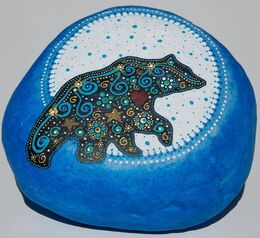|
2/6/2020 2 Comments Heartache Art by Marlyn Bennett Art by Marlyn Bennett The Second of 13 Moon Teachings The Anishinaabeg have sophisticated teachings about the intelligence of the heart that can take many years, if not a lifetime, to come to understand and fully know. In my work on Indigenous knowledge, identity politics, the land claims process, and cultural genocide I have had to reflect on the intelligence of the heart over and over again. I cannot teach the depth of this in this short blog. In the immediate, though I can offer two short teachings that I think many people will find useful. As you read on though, be forewarned that you may be triggered. Pain is Not a Competition Some time ago a friend told me a story about an experience she had with a ‘victims of a sexual violence’ support group that she herself had facilitated. This experience was an important teachable moment for the members of the group. Support groups are important because through them victims are provided a safe context where they share their thoughts and feelings about the violence that they experienced with people who have had similar experiences. Through sharing with people who are like them a context of wellness potentially presents itself. In this particular support group, my friend told me that the women began to compare their pain in a competing way through offering statements such as “he raped me more than once”, “he raped me with a knife to my throat”, and so on …. Upon observing this my friend was compelled to gently interfere because the process of sharing for social mirroring and potential healing was becoming more of a competition. She reminded the women that they were gathered together to support and listen to one another. She carefully reminded and coached the women to understand that support groups are not about members competing with one another; rather support groups are about social mirroring and all that is inherent such as listening to and gaining understanding from people who have had similar experiences. She implored the women to hear and understand what she was saying because as a wellness professional she knew that it is through the medicine of social mirroring that people gain, in the very least, a tiny little bit of medicine, where after, this little bit could become the seed for more healing to follow. My point is, it is a good practice not to silence people who have had a similar experience as you. Rather, it is best to listen to others where in turn others who understand your pain will then listen to you when you share. Pain is not a competition. Wellness can be found in listening. On Vicarious Trauma Heartache is never the same for any two people; even when the traumatic event that causes the heartache is the same, we all experience things differently because many things mediate our personal responses. For example, our various subjectivities mediate what we observe, how we feel, and how we cope. Another way to say this is there are multiple responses to the same stimuli; there is no universal response to any one trauma. All humans have a subjectivity that includes such entities as a person’s age, gender, and race. While the concept of subjective responses to violence are easily grasped, some people struggle with understanding how at times the same traumatic event can become vicariously magnified in one person. Understanding vicarious trauma requires a little more conceptual thought but it can be done. In a home where an episode of physical violence has occurred, while each child will experience the trauma based on their subjectivity, some of the children also experience vicarious trauma. They do this through reading the pain on their sibling’s faces and bodies, where through this reading, they themselves experience additional trauma. For example, an older child who feels responsible for the safety of younger siblings may observe and read the pain in their faces where through this process additional trauma becomes inscribed in their own heart and mind thus deepening the heartache. Depending on the number of children involved, vicarious trauma can be two fold, three fold, four fold, five fold, six fold, seven fold… . No two people share the same trauma; subjectivity mediates. We must also consider the possibility of vicarious trauma. Chi-Miigwetch for reading this and thinking about it.  © Lynn Gehl, Ph.D. is an Algonquin Anishinaabe-kwe from the Ottawa River Valley. In 2017 she won an Ontario Court of Appeal case on sex discrimination in The Indian Act, and is an outspoken critic of Canada's land claims process. Recently she published Claiming Anishinaabe: Decolonizing the Human Spirit. You can reach her through, and see more of her work, at www.lynngehl.com.
2 Comments
Corinne
2/9/2020 03:55:38 pm
Chi miigwetch
Reply
sunne' FAMILY young
2/10/2020 02:16:00 pm
Lynn. Your e-mails always seem to come at just the right time when i need them the most. You have helped me so much over the years with your writings.
Reply
Your comment will be posted after it is approved.
Leave a Reply. |
|
To subscribe to Lynn's Blog: click here
To subscribe to Lynn's Newsletter: click here To follow Lynn on her Public Facebook Page: click here To subscribe to Lynn's YouTube channel: click here To book Lynn as a speaker: click here To contact Lynn/License her work: click here Copyright Dr. Lynn Gehl, 2024 All Rights Reserved
|
 RSS Feed
RSS Feed
